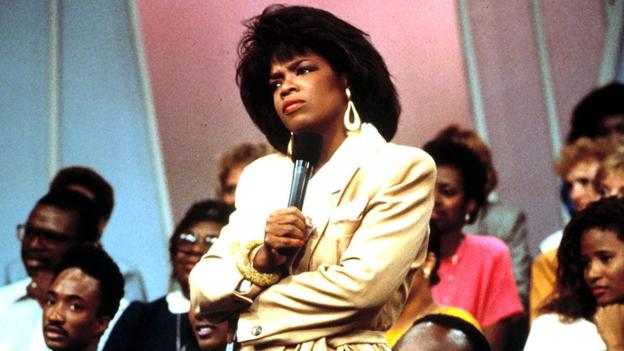You may have noticed that our theme for Black History Month this year is black performers on television. And you basically can’t talk about black people on television without talking about Oprah Winfrey—which is part of why I’ve gone with the image I did. You see, I’m pretty sure I watched the first-ever episode of her nationwide TV show, back all those decades ago. My mom was a Donahue watcher, but when Oprah got a show, Mom started switching back and forth depending on whose show looked more interesting that day. And while I will have things to say about her acting, yes, that’s where I think of her first. With that hair.
She’s open about the horrors of her earlier life. Molestation, neglectful parenting, desperate poverty. A teenage pregnancy, though that story was sold to the National Enquirer by a family member, and she wasn’t thrilled by that. Through it all, though, she had drive and passion; her grandmother apparently said she’d always been on the stage, even from childhood. And the support of that grandmother and her probable biological father got her to an adulthood where she started attracting notice for her abilities.
She’s only been in a dozen movies, one as herself and four as a voice actress. But her first movie role brought her a well-deserved Oscar nomination. She played Sofia in Spielberg’s The Color Purple, a strong, passionate woman whose spirit is broken by a system that has no place for strong, passionate black women. It’s one of two movie debuts from that movie to have been nominated for an Oscar, and much as I like Anjelica Huston, her role as Maerose Prizzi wasn’t as deserving. I’m not going to dip a toe into the Birdman debate right now, but it’s worth noting that Winfrey was one of the Oscar-nominated producers for Selma that year.
What she does have, however, is the Jean Hersholt Humanitarian Award, and that’s a place where I feel her legacy is more complicated. Because, yes, she is a serious humanitarian. She’s given hundreds of millions to charitable causes, including education, Katrina relief, and a $12 million donation to the Smithsonian’s Museum of African American History and Culture. On the other hand, she unleashed Doctor Oz on the world, and Dr. Phil, and in general has done some not great things to public health in the US.
Oprah, who was actually originally named Orpah after a Biblical figure, was named one of Ladies Home Journal‘s hundred most influential women of the twentieth century, and if they do the list again in eighty years, it would be frankly shocking if she wasn’t on that. Her influence shows no signs of slowing down now. And even if she were to go into utter seclusion right now, there’s still twenty years this century of shaping media and culture. There is, I would argue, no one like Oprah. She’s even a talented actress, even if that’s not what she chooses to do most.
Be charitable like Oprah; consider supporting my Patreon or Ko-fi!


